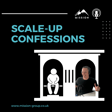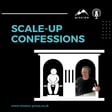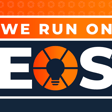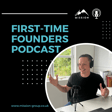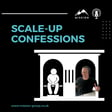Introduction to First Time Founders Podcast
00:00:00
Speaker
Hello, welcome to another episode of the First Time Founders podcast, the show where we talk about how to start a business from nothing and grow it into something meaningful. I'm
Meet Rob Lydiard and Jonathan Dunn
00:00:09
Speaker
Rob Lydiard. I was the founding CEO of a software business called Yapster. It was founded in 2015 and acquired in 2022. I'm now a professional implementer of the entrepreneurial operating system or EOS, which means I work with entrepreneurs and entrepreneurial leadership teams to help them get what they want from their businesses.
00:00:26
Speaker
That's my day job, but in my spare time, I love talking to entrepreneurs and entrepreneurial people and advisors about the first time founder journey, what those of us who've done it learned along the way, so that those that are coming up behind us can make their own mistakes rather than just repeating ours. Today, I'm speaking with Jonathan Dunn, who's the CEO of Anitium, a leading corporate finance advisory practice that specializes in helping owners sell businesses north of 10 million transaction value.
00:00:54
Speaker
They're really good folks. They're very, very um well regarded in the EOS implementer and European client community because they themselves run on EOS and they understand the interaction between operational effectiveness and team alignment and owners ultimately getting what they want from their businesses, both maximizing deal value, but also finding peace and happiness and joy it after the deal.
Anitium's Reputation and Services
00:01:18
Speaker
Jonathan's going to be giving a talk at the forthcoming European Community Conference in London on the 27th of September. And so in this conversation we have today, he's just going to tease some of the things, that the themes that he's going to cover in that talk and hopefully give you a taste of what it might feel like to get into the Anishinaabe network. We talk about some of the fellows dinners that Anishinaabe hosts periodically. I go to, probably go to one and a quarter.
00:01:43
Speaker
um where they just get founders and owners that have sold businesses through Initium together just to talk about life, share experiences, celebrate what they've achieved and continue to find meaning in the next chapters of their lives. Now, bear in mind that Initium don't get paid anything for this, right? They typically get paid for advisory work before a transaction and then some sort of success fee on transaction. So it's kind of proof in the pudding that they care about life beyond the deal.
00:02:10
Speaker
So I really would recommend reaching out to Jonathan on LinkedIn, connecting with him at the European conference if you're able to get there um and just enjoy this conversation and any other content you can get from Anishina. If you're an ambitious owner, you want them in your camp. So without further ado, I give you my conversation with Jonathan Dunn.
00:02:35
Speaker
Jonathan, welcome. Thank you for doing this. My pleasure. Jonathan, we first met at last year's ah European EOS conference. You you gave a talk advising entrepreneurs in the audience how they could have a I wouldn't say enjoyable, but a much more efficient and effective um exit transaction process. And I remember thinking, Christ, I wish I'd met this bloke 18 months earlier. I know today we'll talk about this year's talk, but would you mind just giving like a quick two minute summary on the journey that you' you've been on the firm and roughly what you know what you've always been known for, and then we'll get more into talking about this bright new future.
Making Business Exits Stress-Free
00:03:16
Speaker
Yeah, of course. of course So um mean you you mentioned about how exits can be far from enjoyable and our our mission is to make them as enjoyable as possible. We specialize in advising private businesses through a sale. Our clients are typically worth more than 10 million quid, maybe 10 to 50 plus million. So it's a life changing sum of money and you can imagine the emotional ah stress that's involved for those people. And we do our absolute best to try and de-stress it. And one of the things we've learned across, what, 35 years is that there is actually plenty, plenty you can do ah to de-stress it. And yet the vast majority of people don't even think about it before they decide, I'm going to sell.
00:04:10
Speaker
And so, um yeah, we we consider that if you give it a bit of time and you learn from all of the kind of scars whereve we've amassed over the years um ah with various you know topics um to cover, then ah it will be a better process. It will be a better business.
00:04:35
Speaker
It'll be less stressful, you know, what's not to like. And um and so, yeah, that's that's what we specialize in, helping business ah owners up to and including the sale process. And actually, I don't know if we'll get into this, but beyond it as well, that's where the fun really starts.
00:04:52
Speaker
um So yeah, that's, that's what we do. And at EOS conference last year, I was talking about um some, you know, some of the essence of that and majoring actually on what we've discovered is that people don't really measure the things that really matter.
Importance of Strategic KPIs in Sales
00:05:12
Speaker
um And I wouldn't, I would say that EOS, you know, is a great tool. We know that we've adopted it ourselves and we love it.
00:05:21
Speaker
But it's not really focused on kind of strategic what I would call strategic KPIs, namely those that really matter when it comes to selling a business. And so yeah, I was just on a mission to educate as many people as possible to start you know weaving that into the EOS ah mantra and start measuring things that we know are going to make a big, difference big, big difference.
00:05:45
Speaker
ah I love that. the We talk a lot about the leading indicators, right? And of course, the leading indicators are supposed to drive the P and&L and other critical metrics that that are going to make your dreams come true as an operator. We talk about helping people get what they want from their business, whether that's an exit or three generations family outcome, like that's really up to the up to the the owner.
00:06:05
Speaker
And so those that do want an exit, I can 100% see the value of partnering with someone like you to get clear on what they want and what they need to do to get there. yeah And then we can help them keep the trains on the tracks, doing the right things week to week, quarter to quarter to make that vision come true. Yeah. And I think just to put a bit of flesh on it, if I just take one thing,
00:06:28
Speaker
yeah The metrics that people tend to land on to measure their own leading indicators, they're they're pretty operational, obviously. um And what you find is that in measuring those, they sometimes just lose sight of what a buyer is going to ask for. And you know there isn't a lot of overlap between the the OS scorecard leading indicators and actually the first questions on the lipsp of lips of a buyer.
00:06:56
Speaker
And the you know the buyer is most interested in how do you make money? Where do you make it? Who are your best customers from a money-making point of view? What products are ah the ones that give you 80% of your margin? um And ah all of these things, which are very commercial, understandable questions,
00:07:19
Speaker
It turns out most people think haven't really either thought about it or haven't certainly haven't measured it in the way that a buyer wants to see it and see it evidenced. That's just a you know a way of explaining that you've got to try and look at this through the eyes of a buyer. and you know anybody Unless you bought a business, you won't necessarily understand what those kind of questions would mean.
00:07:44
Speaker
But believe me, they're pretty fundamental questions and it really ought to be the case that you can answer them pretty quickly.
Value Creation and Risk Management
00:07:55
Speaker
Totally. can you Jonathan, can you talk a bit about the value creation service that you've developed at Anisium and how that interacts with EOS? Of course, you and I have the privilege of some shared teams, some shared clients. We don't necessarily need to name them, but I think it would really help people understand what a value creation journey looks like and how that interacts with the EOS process.
00:08:15
Speaker
Yeah, of course. So sometimes we act for clients who are just kind of ready to go through a sale process and we'll always make sure that we've understood what they want from a process and what's really important to them and all of that stuff. But if there are enough boxes, ticks that we say, actually, you know, we can get on with this, then we'll do that.
00:08:38
Speaker
But a lot of clients you know find out in that sort of initial assessment that there there is something ah you know that needs addressing in the business. And sometimes they may want 30 million. And we're saying, well, actually, you're not going to get that. You're probably going to get 20 or 15 or something like that based on today's market. And they'll say, well, how do I get to 30? And um that is obviously involving a journey, which we call the value creation journey.
00:09:08
Speaker
And what we do is we, having assessed where they are, we sort of plot a roadmap that says, well, if you want to get to 30, there's this stuff you can do to enhance value um and grow the business. And there's this stuff that you really ought to do to make it more viable and just less complex or whatever it is, you know, just make the transaction easier. And those two kind of enhanced value and de-risk sort of moves simultaneously through often so two, three years worth of navigation on this roadmap. And the joy of putting this together with EOS is that you can, of course, weave in those goals into the EOS program and make sure that your box and your annuals and your quarterlies have a nod to this stuff. you know And some of it's a long-term
00:10:03
Speaker
aim and ambition. Some of it you really got to get on with that now. And um and we found that absolutely EOS program, and it's a lot more difficult to get clients to focus on those actually because of the tyranny of the urgent. The discipline of doing that preparatory work towards a sale as part of an EOS program is like magic. And and we ah yeah know talk about our most recent one, Rob, that we're working on together. It's it's it is a really potent combination, isn't it, where they're implementing EOS alongside this value creation program and the management team have been aligned with it all. you know Only because of what we're doing and you're doing has the owner decided that it makes sense to
00:10:57
Speaker
Sort of plot a path, paint a picture for his management team and say, look, this is what I'm aiming for. Why don't you join me in this and we'll motivate you and incentivize you. And it's just, yeah, it's it's the way it should be done in my view. And um and ah yeah, it just makes better businesses more saleable. Shall we talk a little bit about what's in some of those early work streams? Cause I think it's interesting. And again, without revealing any, any competencies,
00:11:25
Speaker
What I found really exciting is um I looked at the initial briefing, shared with the permission of the client before we did the session. And all I did is made a note of what I presume to be issues that were likely going to arise on the journey based on what was in that document. And I didn't talk to the team about it because I was sort of hoping that they were, you know, you'd already shared the document with them as well. And so I was just sort of just checking that the items that they had up on the issues list were consistent with the items that you'd understood them to have on their issues list.
00:11:54
Speaker
as part of their value creation journey. And it's great because they're they're looking at a transaction event, so the three years, which coincides really tightly with that three-year picture on on EOS. And we just got to the end of vision building, too. So for the uninitiated listening, you do a focus day on day one, figure out the structure for the organization.
00:12:12
Speaker
vision building one 30 days after that, where they start thinking about where they're going, their kind of 10-year vision. And found that owners that are looking at selling a business, often the 10-year vision is after their intended 10-year of ownership, which might be an interesting thing to talk about, Jonathan. But the three-year is right on that kind of target transaction date. And so then they do their one-year goals, and they start setting 90-day priorities and living with issues that they're not going to get to.
00:12:37
Speaker
at the end of that vision building too. So about 60 days from the first day together. I was so proud of them because the rocks that they set were both tactical and strategic. There were things that their kind of teams need them to prioritize that perhaps wouldn't be on Anishinaabe's radar, the real operational where EOS is bread and butter. But also like it really dovetailed beautifully with things like um sharpen up the proposition, like work out exactly what it is we're selling and what we're going to sell more of.
00:13:04
Speaker
yeah journey um Yeah. What can you remember some of the other work streams that they'll be over the first three quarters? Yeah, I'll give you an example of things that are, um you know, value creating that we discussed that we felt they could do. And things that actually just reinforce or create some resilience in the business, which would just make common sense. And so taking the kind of growth plan, you know, we we We unpicked their wholesale strategy and using the kind of body of evidence that the data provided, we're able to talk about well where are the priorities? what's What's the low hanging fruit in our future that you really must deliver if you're going to create the value that we're all looking to create?
00:13:55
Speaker
And what must you stop doing and stop chasing? and um and And yeah, so it's kind of reordering priorities. I think in their mind, this this was really useful because you know as usual, there were loads of opportunities, but no real ah compelling reason to prioritize any of them. And um this ah you know has created an ordered way of developing the top line um in ah in order of ah ease really and low hanging fruit. So that's, I won't go into the detail of those, but that that's basically what the story was around that. um We also found out in this case that that a lot of the profit comes from a particular stream of revenue.
00:14:48
Speaker
um Such a big percentage is actually that we thought that might be of concern ultimately if it stayed at that percentage to a buyer. So a strategy was set with that in mind as well to really either either because it's so profitable, you know maintain that and build a case for why it is something you can rely on, Mr. Buyer.
00:15:09
Speaker
Or better still, you know, change the mix of revenue a little bit so that percentage drops. And again, that's a strategic aim that isn't easy to fix, but will be front of mind for them, which it wouldn't have been otherwise. And then like yeah to take a ah risk based point. I mean, there's one guy in this business who frankly, if he did fall under the proverbial bus, they would be in quite a lot of trouble.
Keyman Insurance and Post-Sale Goals
00:15:37
Speaker
And they've got no key man insurance on him.
00:15:40
Speaker
It turns out and ah not for any reason other than not thinking about it. Which is normal, right? was i hope is this this This features in the first 90 days he getting Keyman cover on that guy because it would be a disaster if he did get knocked over. So yeah, just things like that, you know? Yeah. Yeah.
00:16:02
Speaker
it was really It was really good. What I really liked is because of the way this process is a dovetailing, some of the rocks are ah big rocks, but are not super time intensive. So there were like two or three that were decide rocks. So there's some quite serious conversations that need to be had, heart to heart, where are we going?
00:16:21
Speaker
but um it was like a line in the sand so but within three months we're going to have made a decision on which side of the fork in this road we're going to go yeah and and I don't think EOS alone would have provoked those strategic decisions because there's nothing in the EOS process in and of itself that would have caused us to right say you have to make a decision on this yeah like now because we had said actually um unless you think you need to, because we're facilitators, right? We're not consultants. um We would let the management team make make that call. And so they really understood the value consequence of making the call early but because of the work they're doing with you guys. So anyway, I won't label the point anymore, but I want people to understand how these things go together. Can I just add one other thing, which is an important dimension, which I imagine applies in every you know private it sale
00:17:16
Speaker
in the context of EOS. um you know let's Let's say it's a three year timeframe. And I guess we've been guilty of it in this conversation. We focused on value creation.
00:17:31
Speaker
There's a whole other dimension to a deal, which is um how it feels for the owners. Yeah. Actually, what do they want to do afterwards? And do they want to stay involved? Or do they actually want to get to the point where they this is the climax of everything and they can legitimately walk off into the sunset because the business won't be affected by that? And if if if you have that conversation around goals and things need to change because maybe, I mean, take that guy that I mentioned where the key man wasn't in place for. So important to understand what he wants at the end of three years. it Does he see another you know another three or four years in a business doing what he does? um Or does he see it differently? And without that conversation, you wouldn't know quite how the accountability chart needs to reflect a future state for this business.
00:18:27
Speaker
And um you you therefore dovetail the goals led conversation with the accountability chart. And you know what you've got to do to shape something that when they sell the business, they can do what they want to do, as opposed to be ah the you know a in perilous state of a buyer deciding for you.
00:18:48
Speaker
Yeah, makes sense.
Combining EOS with Value Creation
00:18:50
Speaker
ah Jonathan, winding forward to the 27th of September in London, the US Community Conference this year, you're given another signature talk as one of the sort of gold partners. Can you give us a look like have you have you decided what you want to say? Yeah, like what do you want people coming in? Is there any prep people can do to get the most out of the session? And what do you want them to feel or think or know when they leave? Yeah. So I mean, when when we stood up last time, Rob, we loved it but didn't have that kind of real experience of um EOS ah implementing ourselves if you will and
00:19:31
Speaker
you know The difference this time round is that we, having been through it and you know enjoyed most of it, and as everyone does, and just seen the power in it, um we want to really sort of, I guess, re-address some of the points we made previously. But the the kind of new angle on this is, look, we've done this. We can now see the power of combining this with a value creation story.
00:20:01
Speaker
we can evidence that um and we really wanna get people in the room that are focused either whether they're implementers that have got clients that have ambitions to sell or they're in the room because you know they they're gonna implement EOS or thinking about it and they will at some point sell. I just see it, as I said earlier, I just see it as our mission to try and make sure they don't miss out on this kind of combined um
00:20:32
Speaker
approach, which if they get it right, I mean, frankly, dare I say, they got no excuse. if they If they've done the strategic thinking and they've got the means to apply it, or you've you've just created the best possible chance of creating a brilliant business that is such an impressive business that is kind of operating level. Everything a buyer expects, they'll find the process will be smoother. You'll know, yeah, it'll just de-risk everything and it'll make it more enjoyable and more valuable, right? And so why wouldn't you?
00:21:17
Speaker
And then we'll be able to sit shoulder to shoulder with them at one of your fellows
Community Events and Post-Sale Challenges
00:21:21
Speaker
dinners in the future. So again, those listening, you need to connect with Jonathan on LinkedIn after this. I'll add his contact details in the show notes. This guy and Liz and his colleagues, they throw fantastic events and Usually the room is overwhelmingly people that are not quote prospects for an issue They're just kind of like thank you events and celebratory events for people that have worked with an issue issue in the past and you have this there I know we've got to go in a second Jonathan, but you just want to say a word about the About those dinners that you host and that kind of community of folks that you just keep together Not because you're selling anything to them just because just because Well, they're friends
00:22:01
Speaker
But you get friends together after all. And I mean, our our industry is so guilty of being very transactional, right? It's all about the deal. And we've realized it's about way more. It's way beyond that. And what we've seen over the course of our history is people who've been through a sale process and gone on to do something else have enormous impact.
00:22:29
Speaker
They're suddenly liberated to pursue something they've always wanted to pursue. And there's such a range of things that people go on and do. A lot of them want to give back. That's at the heart of it. right They're grateful. They're really humble people that just can't believe how lucky they got. and want to do something to make their mark and that might be giving back in a business sense so some might invest in new opportunities some a lot go on to sort of consult and just add a lot of wisdom and value to people on the journey and they love that and some go into
00:23:11
Speaker
the third sector, um some go into politics, some write books. Honestly, there's a whole tapestry of things that people go on and do. And when we realize, it this is amazing. And the other thing we realize for every story that I've just sketched out,
00:23:30
Speaker
There's one that's completely opposite where some where and the worst possible thing as far as I'm concerned, you go through all that process, you make all that money, you create all that opportunity and you regret it. yeah And you would be surprised how many people find themselves in a complete vacuum, in a complete spin. They've got everything the world would judge as being successful and yet they feel empty.
00:23:59
Speaker
because they've lost their identity. They don't know what to do. they the The last thing they want to describe themselves as is retired. And so when they go to a party, how do they explain who they are? you know and and And this whole kind of personal psychological dimension is something our industry completely ignores. And that's what the fellows program is all about. It's helping people find a purpose beyond the site.
00:24:29
Speaker
And we found that there are so many people in this community now. There's such an ecosystem that supports it that we can connect people to help that journey and make it as good as it can possibly be.
00:24:43
Speaker
And what you get is just friendship. You get joy. You get all the stuff that makes our job totally the best. And so these events, I love them. I love them. The only thing about them is noise that the noise in the room is too high because the energy in the room is amazing, isn't it? And so, yeah, it's not a business development event. it's not that That's the last thing it is. It is basically introducing people to the whole philosophy of what a business sale really ought to be as evidenced by the people in the room who are there without any obligation. They're not being paid to be there. They just love this luck and post-natal group really. They just can't stop talking about it. It's amazing.
00:25:29
Speaker
That is so true. Listen, so if you're, um if you're watching or listening to this and you've got yourself a ticket for the EOS Community Conference on the 27th of September in London, do not miss Jonathan's talk and do not miss the opportunity to connect with him on LinkedIn. Go grab him afterwards. If you've got a business that you, whether you're thinking about selling it or not, like seriously get involved. I've been to a number of those fellows dinners and it will change your perspective, change your perspective on your present and your and your future, and you'll meet some some wonderful people. Jonathan, thank you so much for doing this. It's always it's been a pleasure. Thanks, Rob.

